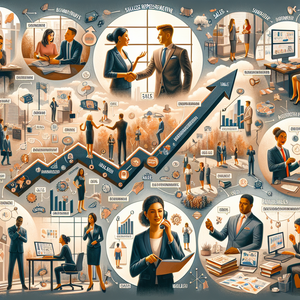The Rise of the Sales Technologist: Redefining Sales Leadership in the Age of Digital Transformation

The sales profession has always been rooted in understanding customer needs and delivering value. Historically, this understanding was achieved through intuition, experience, and personal relationships. Sales Directors would rely on face-to-face meetings, gut instincts, and basic historical data to plan their strategies. However, in today’s digital-first world, this approach is no longer enough. The influx of vast amounts of data, paired with advancements in AI and machine learning, has fundamentally altered how sales teams operate. Predictive analytics and AI are now enabling companies to anticipate customer needs with pinpoint accuracy. For example, by analyzing customers’ purchase histories, online behaviors, and even social media activity, sales teams can identify patterns that reveal what products or services customers are most likely to purchase next. These insights allow Sales Directors to create highly targeted campaigns, launch personalized outreach efforts, and allocate resources more effectively. This shift to technology-centric sales doesn’t just enhance efficiency; it levels the playing field in competitive markets. Businesses that embrace these tools gain a distinct advantage by operating faster, smarter, and more strategically. For Sales Directors, failing to adopt these technologies risks falling behind competitors who are already using them to improve their customer relationships and bottom lines.
Why Sales Directors Must Become Technologists
The fear that automation and AI will make certain roles obsolete is widespread, and sales is no exception. Some have speculated that technology could replace traditional sales positions, just as self-checkout kiosks have begun to replace cashiers in retail settings. While it’s true that machines can handle repetitive tasks like data entry, lead scoring, and even some initial customer interactions, they cannot replicate the nuanced human skills required for relationship-building, complex negotiations, or strategic vision. This is where the Sales Technologist shines. By embracing technology, Sales Directors can enhance their leadership capabilities and remain indispensable. For instance, AI tools can help segment customers into highly specific groups, enabling hyper-personalized engagement strategies. Machine learning models can forecast sales trends and help leaders set more accurate revenue targets. Automation can streamline administrative tasks, freeing up time for Sales Directors to focus on higher-value activities such as coaching their teams or developing innovative strategies. However, becoming a Sales Technologist requires more than simply adopting new tools. It demands a mindset shift. Sales Directors must learn to interpret sophisticated data sets, understand the mechanics of AI-driven systems, and integrate technological insights into their decision-making processes. This hybrid skill set—combining traditional sales expertise with technological fluency—will define the most successful leaders in the years to come.
Real-World Applications of the Sales Technologist Role
The concept of the Sales Technologist isn’t just theoretical; it’s already being implemented in forward-thinking organizations. Companies like Salesforce, HubSpot, and Microsoft are leading the charge by integrating advanced AI tools into their customer relationship management (CRM) platforms, enabling sales leaders to make data-driven decisions in real time. Consider a practical example: A Sales Director at a multinational e-commerce company uses AI-powered CRM software to analyze purchasing patterns across different regions. The system identifies a growing interest in sustainable, eco-friendly products among urban customers. Armed with this insight, the Sales Director collaborates with the marketing team to launch a targeted campaign promoting these products in urban areas, resulting in a surge in sales and increased customer loyalty. Another real-world application is predictive lead scoring. Traditionally, sales teams would rely on intuition or basic metrics to prioritize leads. A Sales Technologist, on the other hand, uses machine learning algorithms to predict which leads are most likely to convert based on behavioral data, previous interactions, and market trends. This approach not only increases efficiency but also boosts conversion rates by focusing resources on high-value opportunities.
Challenges in the Transition to Sales Technologists
While the rise of the Sales Technologist presents exciting opportunities, it also comes with challenges. One of the most significant hurdles is upskilling. Many Sales Directors have spent decades mastering traditional sales techniques but may find themselves unprepared to navigate complex technologies like AI and machine learning. Organizations will need to invest in training programs to help these leaders develop the necessary technical skills. Another challenge is the risk of over-reliance on technology. While AI and automation can provide valuable insights, they are not infallible. Human intuition, creativity, and empathy remain irreplaceable in the sales process, particularly when dealing with complex customer needs or high-stakes negotiations. Striking the right balance between technological efficiency and human judgment will be crucial. Finally, ethical considerations must be addressed. As sales teams gain access to more detailed customer data, questions around privacy, transparency, and bias in AI-driven decision-making become increasingly important. Sales Technologists will need to navigate these issues carefully to maintain trust with their customers and safeguard their organizations’ reputations.
The Future: Collaborators, Not Competitors
The rise of the Sales Technologist marks a fundamental shift in how sales leaders view technology—not as a competitor, but as a collaborator. Rather than replacing human expertise, tools like AI and predictive analytics are designed to augment it, enabling Sales Directors to focus on what they do best: building relationships, driving strategy, and delivering value. Looking ahead, we can expect to see Sales Directors who are equally comfortable analyzing data sets and leading team meetings. These leaders will use technology to uncover opportunities, mitigate risks, and innovate in ways that were previously unimaginable. At the same time, they will retain the human touch that is essential to sales—empathy, creativity, and the ability to navigate complex interpersonal dynamics.
The evolution of the Sales Director into the Sales Technologist is a reflection of broader changes in the business world. As digital transformation continues to accelerate, the ability to harness technology while maintaining a human-centered approach will define the leaders of tomorrow. For Sales Directors, the message is clear: Adaptation is not optional. By embracing the role of the Sales Technologist, they can future-proof their careers and remain indispensable in an ever-changing landscape. The future of sales leadership is not a choice between humans and machines—it’s about finding synergy between the two. In this new era, the Sales Technologist will lead the way, blending the best of both worlds to drive success and innovation.
Sales Operations Analyst
Salesforce, Oracle, HubSpot, and SaaS companies
Responsibilities
Leverage data analytics and visualization tools (e.g., Tableau, Power BI) to provide insights into sales performance and identify opportunities for process optimization.
Collaborate with sales leadership to forecast revenue and track key performance indicators (KPIs).
Design and manage CRM systems (e.g., Salesforce) to ensure data accuracy and streamline workflows.
Skills Needed
Proficiency in CRM tools, SQL, and Excel for data management and analysis.
Strong understanding of sales processes and operational efficiency.
Knowledge of predictive analytics or machine learning is a plus.
AI-Powered Sales Strategist
Microsoft, IBM, Adobe, and AI-driven startups
Responsibilities
Design and implement AI-driven strategies to prioritize leads, personalize customer outreach, and enhance sales performance.
Work closely with AI and data science teams to interpret predictive analytics for actionable insights.
Train sales teams on leveraging AI tools like chatbots, lead scoring algorithms, and forecasting software.
Skills Needed
Deep knowledge of AI tools such as ChatGPT, Einstein GPT (Salesforce), or similar platforms.
Ability to bridge technical knowledge with sales strategy.
Strong communication skills to effectively translate AI-driven insights into sales actions.
Digital Transformation Consultant (Sales Focus)
Accenture, Deloitte, PwC, and technology consultancies
Responsibilities
Partner with sales teams to identify inefficiencies and recommend digital solutions like automation tools, CRM upgrades, or eCommerce platforms.
Lead workshops and training sessions to ensure smooth adoption and integration of digital tools.
Monitor ROI and success rates of implemented technologies to optimize future strategies.
Skills Needed
Expertise in digital transformation frameworks and sales enablement tools (e.g., Gong, Outreach.io).
Familiarity with change management and stakeholder engagement strategies.
Strong project management capabilities.
Customer Success Manager (Tech-Savvy Role)
SaaS companies, cloud providers (e.g., AWS, Google Cloud), and tech startups
Responsibilities
Use analytics and customer data to proactively identify opportunities for upselling, cross-selling, or addressing churn risks.
Develop and execute personalized customer engagement plans leveraging CRM and marketing automation tools.
Act as a liaison between customers and internal teams to ensure smooth product adoption and satisfaction.
Skills Needed
Experience with customer success platforms like Gainsight or Totango.
Strong analytical skills combined with relationship-building expertise.
Ability to interpret usage data and translate it into actionable recommendations.
Revenue Operations Manager (RevOps)
SaaS companies, enterprise software firms, and eCommerce companies
Responsibilities
Oversee the integration of sales, marketing, and customer success data to optimize revenue generation across departments.
Design and maintain a unified tech stack (e.g., CRMs, marketing automation tools, and analytics platforms).
Develop data-driven strategies for improving sales pipeline velocity and customer lifecycle management.
Skills Needed
Mastery of RevOps platforms like Clari or InsightSquared.
Strong cross-functional collaboration skills to align sales, marketing, and customer success teams.
Experience with automating workflows and processes to improve operational efficiency.


